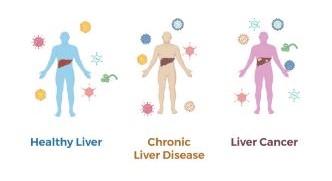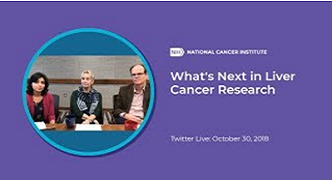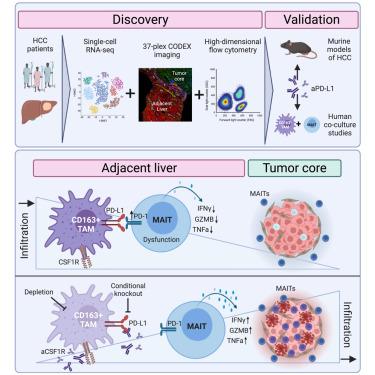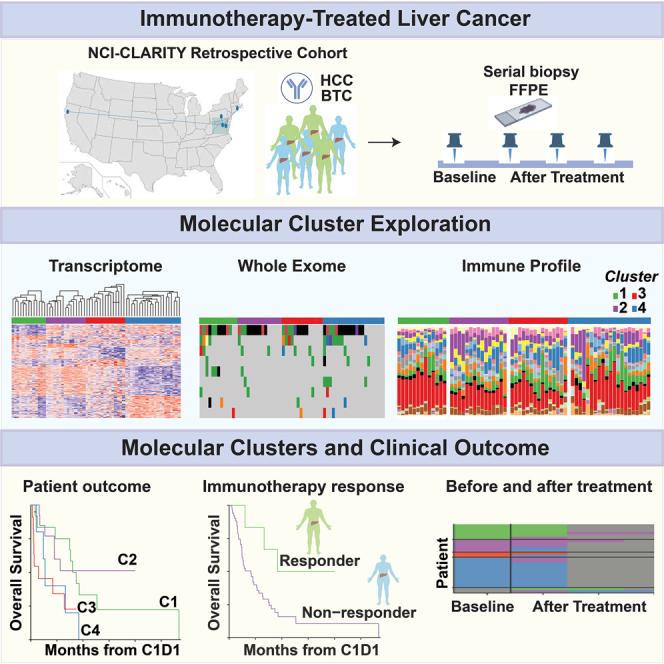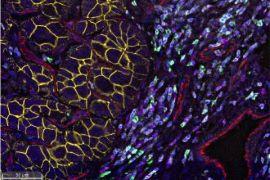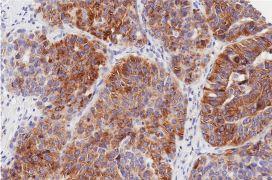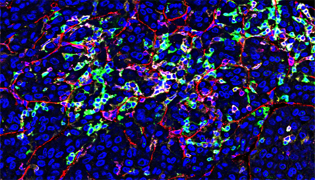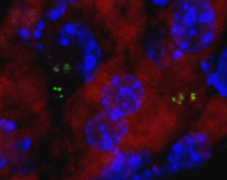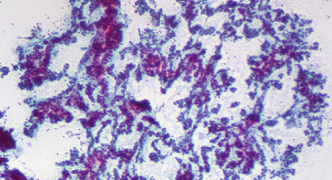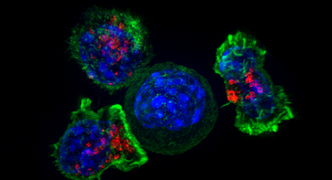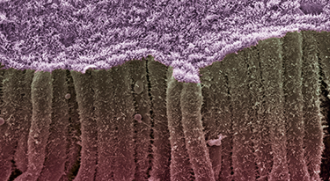Explore more liver cancer research news in the areas of early detection, diagnosis, prognosis, treatment and population studies and health disparities.
Focus Areas:
Dr. Wang discusses a new blood test to identify those likely to develop liver cancer
CancerNetwork, July 14, 2020
In this interview with CancerNetwork, Xin Wei Wang, Ph.D., discusses the clinical utility of a new blood test and how it could potentially change liver cancer diagnoses moving forward. View interview.
A new blood test that may improve liver cancer screening
NCI Press Release, June 11, 2020
LCP scientists have developed a new test that can help identify people who are likely to develop hepatocellular carcinoma (HCC), the most common form of liver cancer. This method uses a simple blood test to check for the patient’s previous exposure to certain viruses. Read more.
Selective CD4+ T cell loss promotes liver cancer development
CCR Milestones 2017
LCP research identified a novel link between obesity-induced lipid accumulation and selective CD4+ T cell loss, which impairs tumor immunity and enhances liver cancer development. These findings shed light on how metabolic changes promote NAFLD (non-alcoholic fatty liver disease)-related liver cancer. Read more.
A mosaic of liver tumor cells
CCR Milestones 2020
Tumors are complex communities of cells. Cancerous cells intermingle with noncancerous cells, and additional diversity arises as a tumor’s cancer cells divide and acquire new genetic mutations. Now, LCP scientists have discovered that the extent of cellular diversity within a tumor may shape its response to immune checkpoint inhibitors in patients with liver cancer. Read more.
Dr. Budhu discusses potential molecular markers in liver cancer
OncLive, October 11, 2019
In this interview with OncLive, Anuradha S. Budhu, Ph.D., discusses using molecular features as predictive markers in liver cancer. View interview.
Diversity of liver cancer cells can impede tumors' response to immunotherapy
CCR News, October 3, 2019
Patients whose liver cancers responded well to immune checkpoint inhibitors in clinical trials had tumors with less cellular diversity than cancers that were not responsive to this type of therapy, CCR scientists have discovered in a new Cancer Cell paper. Read more.
What's Next in Liver Cancer Research
October 30, 2018
Drs. Budhu, Greten and McGlynn join Twitter Live to discuss "What’s Next in Liver Cancer Research".
Seldom studied immune cells in the liver may be helpful in treating cancer
Cell, August 17, 2023
Mucosal-associated invariant T (MAIT) cells represent an abundant innate-like T cell subtype in the human liver. MAIT cells are assigned crucial roles in regulating immunity and inflammation, yet their role in liver cancer remains elusive. Read more.
Tumor biology and immune infiltration define primary liver cancer subsets linked to overall survival after immunotherapy
Cell Reports Medicine, May 23, 2023
Primary liver cancer is a rising cause of deaths in the US. Although immunotherapy with immune checkpoint inhibitors induces a potent response in a subset of patients, response rates vary among individuals. Read more.
Researchers uncover stable molecular networks inside liver tumors
CCR News, December 22, 2022
CCR researchers have uncovered stable molecular networks that cells within liver tumors use to communicate with immune cells in the tumor microenvironments. Read more.
Clinical trial targets cell surface protein GPC3 to treat advanced hepatocellular carcinoma
CCR News, November 30, 2021
Adults diagnosed with hepatocellular carcinoma (HCC ) may be eligible to participate in a phase I clinical trial that takes advantage of a cell surface protein, called GPC3, that is found on most HCC tumor cells, and importantly, is absent on normal liver tissue and in other organs. The trial is led by Read more.
Protein that drives aggressive liver cancer identified
CCR News, July 02, 2021
Researchers at CCR studying liver cancer have identified a protein that may drive tumors to evolve and evade therapy. This finding may help answer a major question in cancer research that revolves around what factors cause some tumors to evolve and become more aggressive despite treatment. The finding could also lead to new therapies for patients who do not respond to treatment with immune checkpoint inhibitors, a type of therapy that has shown some promise in only a small subset of patients with this difficult-to-treat cancer. Read more.
New connection between gut microbes and liver cancer uncovered in mice
CCR News, December 15, 2020
Researchers have uncovered a mechanism by which gut microbes can influence the immune response against nearby liver tumors in mice. The results were published on December 15, 2020, in Cancer Discovery and shed light on how certain diseases that weaken the protective lining of the gut barrier may exacerbate a type of liver cancer called cholangiocarcinoma. Read more.
Clinical trial to determine whether antibiotics can boost immune response in treating liver cancer
CCR News, May 14, 2019
In this clinical trial, patients with liver cancer will be given antibiotics, along with two drugs, to explore whether manipulating microbes within the gut of a patient can boost their immune system’s response to the disease. Read more.
Clinical trial finds combination therapy effective for some biliary cancer patients
CCR News, January 28, 2019
An early-phase clinical trial has established that the immunotherapy agent tremelimumab, combined with microwave ablation therapy, is safe for patients with advanced biliary tract cancer (BTC). Read more.
Liver tumors link to the microbiome
CCR Milestones 2019
LCP scientists show how bacteria that live in the gut can hinder the immune system’s ability to control tumors in the liver. Read more.
Dr. Wang discusses a new blood test to identify those likely to develop liver cancer
CancerNetwork, July 14, 2020
In this interview with CancerNetwork, Xin Wei Wang, Ph.D., discusses the clinical utility of a new blood test and how it could potentially change liver cancer diagnoses moving forward. View interview.
A new blood test that may improve liver cancer screening
NCI Press Release, June 11, 2020
LCP scientists have developed a new test that can help identify people who are likely to develop hepatocellular carcinoma (HCC), the most common form of liver cancer. This method uses a simple blood test to check for the patient’s previous exposure to certain viruses. Read more.
